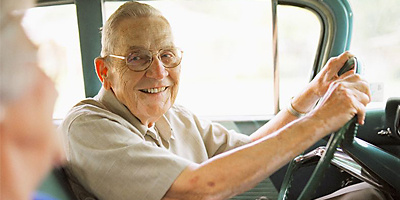
 Charles Vance considers himself a lucky man.
Charles Vance considers himself a lucky man.
In the past six months he has finished chemotherapy and radiation, been declared cancer free, and married a wonderful lady who is “filled with the spirit.”
But he’s not sure he would have made it without the American Cancer Society’s Road to Recovery program, which provides drivers to cancer patients in need.
Vance lives in Fountain Inn, a rural area of Greenville County, and is an active member of New Covenant Baptist Church in Simpsonville. In fact, in a what-goes-around comes-around scenario, Vance was a driver for a church outreach program.
He became the one in need in 2007, when what he thought was a kidney stone turned out to be bladder cancer and he began his long battle with the disease. For a while, Vance drove himself to his appointments using the church van, but chemotherapy made him weak and he began to worry how long he could continue.
That’s when he saw the flyer for Road to Recovery in the waiting room of the Cancer Center of the Carolinas and knew it was a sign.
“The Lord puts people in your life to care for you at certain times,” he said.
He contacted the program, went through the qualification process, and soon was being driven to his treatment by volunteers in his area.
Vance said three of his regular drivers — Diane Grether, Lynn Farrington and Keith Block — became much more than just a ride to and from the hospital, they became friends. Each of them helped celebrate his health and good fortune at his wedding in October.
Grether, the program’s Greenville coordinator, said she was always impressed by Vance’s positive spirit, even when he was so sick.
“Charles is just a special, special man,” she said.
The drivers have to be special too. Grether said chemotherapy is once a week and can take up to five hours, and radiation is every day for about five weeks.
“It’s draining,” she said. “To do this is tough, and costly, because nobody pays for the gas.”
It’s also worth it.
“The patients make it worthwhile because they’re so thankful,” Grether said. “And the drivers do it willingly and lovingly. They’re so good to the patients. They’re really remarkable people.”
Lang Hunt, a transportation solutions manager for the American Cancer Society, said they always need more volunteers. Drivers must have their own car, a valid license, good driving record and proof of insurance.
“A lot of volunteers are people who had cancer themselves and won,” he said. “Or who had a family member … and they want to give back.”
Grether, who has been with the program for five years, is a breast cancer survivor. And Vance said he plans “to pay it forward” and become a volunteer too.
But first he has to finish his recovery. He said he already pushed himself too hard and suffered a setback, and nearly scared his poor wife Betty to death.
“I’m taking it very easy this time, trying to avoid having my bladder out,” he said. “I just pray every day. It’s in the Lord’s hands now.”
Hunt, who is a member of Our Lady of the Hills Church in Columbia, said Charleston has a growing need for drivers, but volunteers are wanted across the state.
For more information, contact Lang Hunt at (803) 750-1693, or the American Cancer Society at (800) 227-2345.
